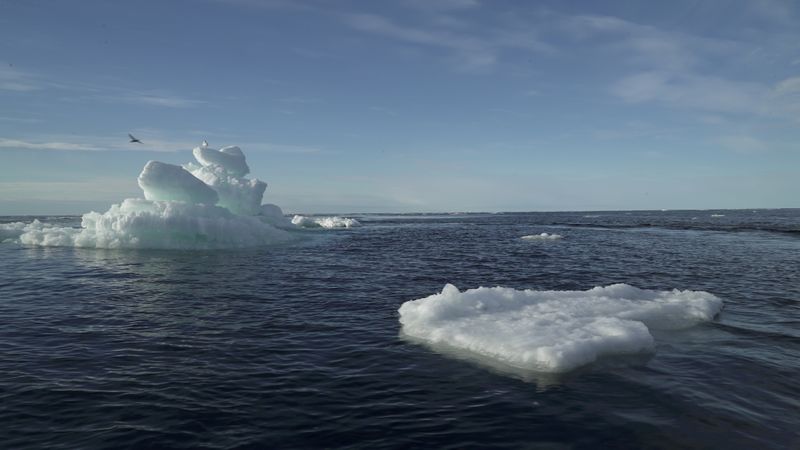By Humeyra Pamuk and Tom Balmforth
WASHINGTON/MOSCOW (Reuters) - With a warming climate melting more Arctic ice cover and global industries eager to exploit the region for shipping, fishing, drilling and mining, the United States and Russia sounded a rare, cooperative note going into an Arctic meeting this week.
The conciliatory tone was encouraging to governments, local residents, investors and environmental groups worried about a lack of regulations and potential environmental damage as industries look northward to the world's largest remaining oil, gas and mineral deposits.
"Our vision ... is very much one of cooperation," U.S. State Department Arctic Envoy Jim de Hart told Reuters in an interview ahead of the biennial meeting of the eight Arctic Council nations. "It's about action on climate change. It’s about good science ... and keeping the region peaceful.”
In Moscow, senior Arctic Council official Nikolai Korchunov also struck a conciliatory tone, telling a briefing last week that Moscow and Washington have "very constructive" dialogue at the Arctic Council.
U.S. President Joe Biden's concern about fighting climate change, a U-Turn in Washington's position, was especially welcome at a time when arctic temperatures are rising faster than the global average and summertime sea ice is increasingly sparse and thin.
Some worried, however, that deep U.S.-Russian disagreements over other, unrelated issues could hinder talks between U.S. Secretary of State Antony Blinken and his Russian counterpart, Sergey Lavrov.
Since Biden was inaugurated in January, Washington and Moscow have clashed over charges of Russian interference in the U.S. presidential election; challenges of Ukraine's sovereignty; Moscow's jailing of Kremlin critic Alexei Navalny; and U.S. support of democracy activists in Russia and Belarus.
Both governments are also wary of each other's military activity in the Arctic, and Washington is watching China's economic moves there.
Fighting climate change will be Washington's priority, de Hart told Reuters. That is a sea change from former President Donald Trump, whose delegate to the 2019 Arctic Council meeting blocked a declaration saying climate change was a serious regional threat.
"There's a very great understanding of the problems facing the Arctic region and the interest of our countries in developing collective approaches to managing the region's development," Korchunov said.
Russia is to take the Council’s rotating leadership from Iceland until 2023. Other nations on the Council are Canada, Sweden, Finland, Norway and Denmark, with indigenous populations also represented.
"We don't have any friction,” Korchunov said. “Yes, there can be disagreement on some issues, but ... they are generally tactical in nature.”
The U.S. vote in 2019 against the climate change declaration made it the first such measure to fail since the group was formed in 1996, and de Hart pledged there would not be a repeat this year.
"I am very confident that, at this ministerial, there will be agreement," de Hart said. "What you will see is climate elevated as a priority for the Arctic Council and for its future work."
WATCHING CHINA
As Washington advocates for sustainable development, it is keeping an eye on China's long-term ambitions and billions of dollars of investment in the Arctic. China is not an Arctic Council member but it declared itself a “near-Arctic” nation in 2018 and said it wanted to “participate in the governance of the Arctic.”
"We want the Arctic to be open for business,” de Hart said. “By that I mean business and investment according to high standards – respects environmental protection, respects local communities."
Chinese investors have bid unsuccessfully to open mines in Canada and Greenland, which the U.S. Geological Survey says has the world’s biggest undeveloped deposits of rare earth minerals.
Another U.S. concern is the Russian military, de Hart said, while Korchunov said Moscow has its eyes on any NATO moves to expand in the region.
"We just have to have our eyes open and make sure that we're examining those activities through a national security lens," de Hart said. "Some of (Russia's) military activities and the behavior of some of its forces are not transparent, provocative and sometimes unprofessional, and that's a concern.”
"It would be important for us to have the constructive spirit of cooperation that is in the Arctic Council ... in the military-political sphere," Korchunov said.
On Monday, Russian Foreign Minister Sergei Lavrov proposed that council members have heads of their respected armed forces meet regularly to defuse any tensions that arise.

Lavrov accused Norway of trying to justify a greater NATO presence in the Arctic and dismissed the western alliance's concerns over increasing Russian military activity in the Arctic.
"It's long been well known to everyone that this is our territory, this is our land, we are responsible for ensuring that our Arctic coast is safe. And everything our country does there is absolutely legal and legitimate," he said.